Child labor in Western countries
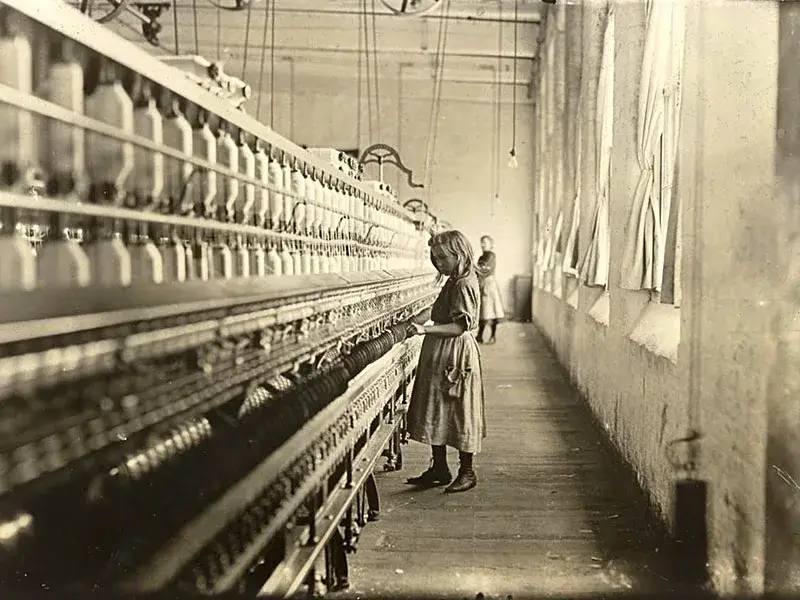
A girl at a weaving factory. Lewis Photography
In Russia in the 19th century, children also worked equally with adults, and this was a big problem. My eight-year-old great-grandfather helped some merchant at the market at the beginning of the 20th century. But Western countries seemed more interesting to me. It seems like the industrial revolution, work should be easier, but no. Even children as young as five worked. You look at the current ones, and it just doesn’t fit in your head. Although a different generation, a different reality. I think the last generation that would theoretically be capable of this just grew up during the war years. Then the benefits of civilization, the right laws finally allowed children to feel at least a little like children. But I started talking. Let's look at 19th century child labor using the examples of England, the USA and France.
England
England was the first to enter the industrial revolution. New factories and factories opened, where even children went to work for pennies. Child labor was exploited and the wealth of the rich grew. At the beginning of the century before last, children even worked 16 hours! In coal mines, many did not live to be 25 years old.
Children in poor families were a burden for their parents, which is why they were often sent to work. There they at least brought in some pretty penny. Often, in the Victorian era, so revered by the British, children worked as chimney sweeps. I found information that three-year-old children worked, but I doubt it. Five or six – I can still believe it. Thanks to their small parameters, they easily made their way into the chimney and cleaned it. Elbows, palms, knees - all covered in cuts and abrasions from the brickwork. Lungs in soot. Someone got stuck in a pipe. Then they specially lit the fireplace so that the child would try with all his might to get out. It’s clear that the idea is so-so. Many simply suffocated because of this. Chimney sweeps beat children to force them to do difficult work. Some children were not fed so that they would remain thin and fit into chimneys. Dickens describes something similar in The Adventures of Oliver Twist. In general, this writer has a lot of books about the difficult childhood of English children.
Some of the children loaded carts with coal, others dragged these carts through tunnels up to 1 meter high. Because of this, their spines became curved. Other children closed and opened hatches for passing carts. They worked in complete darkness for up to 18 hours a day. They received a few pennies a week. In 1842, the proportion of children and youth in coal and metallurgical mines ranged from 19 to 40%.
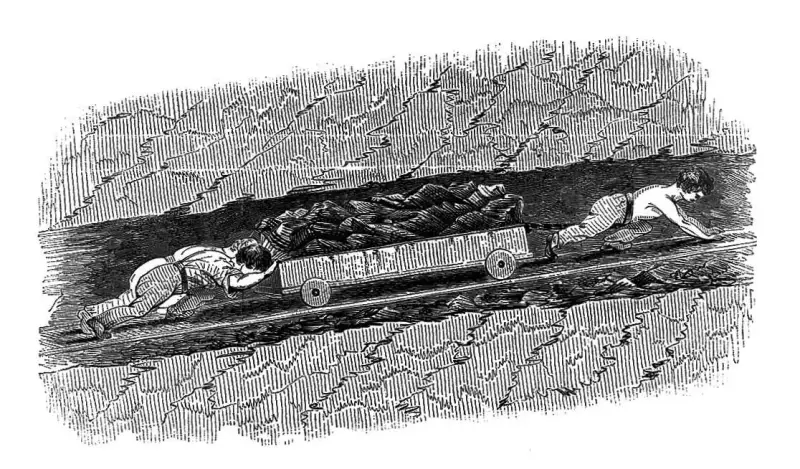
English engraving from the 1840s
In the 30s, human rights activists began to become interested in child labor. One of the reformers, Richard Oastler, sought to improve working conditions. He quoted the words of one slave owner to the special commission on this issue:
At the same time, some children preferred to work rather than be at home. The conditions and attitude of their relatives towards them were even worse than at work at the factory. In the Victorian era, 10 people lived in an area of 15-25 square meters. m in complete unsanitary conditions. The slums were infested with vermin and disease was rampant there. It is not surprising that of two evils, some children preferred the lesser.
In 1841, the most common occupations for boys were agricultural labor, domestic service, and cotton production. 196, 640 and 90 people under 464 years of age, respectively. In 44, 833 girls were domestic servants, 20 were employed in cotton production, and 1841 were dressmakers.
According to the law of 1841, children under 10 years old could not work in coal mines. In 1847, a new law was passed that established a 10-hour working day. Since 1874, children under 10 years of age could only work in light manufacturing.
USA
Yes, it is now the United States that has become detached from everyone; there are many different rights there, some of which we do not understand. But that's not the point. Children there and here at the age of five already understand smartphones, learn to read, go to sections, and just play on the playground. But more than a century ago, a five-year-old child worked in a textile factory, picking cotton in the fields. And he did it for 14 hours. Child labor appeared there from the very beginning of colonization. But in the industrial era it only intensified. The USA abolished slavery, but what about without cheap labor? The children took on this burden. The children worked for pennies. Children did not unionize. The children did not protest.
At the turn of the 18th and 15th centuries, about XNUMX% of children under XNUMX worked. At the same time, they could not go to school. But they worked in dangerous places. They were hired to work in mines and factories. And they did what adults couldn't do. For example, thanks to your height, you can climb under a machine or climb inside to fix something.
Working children neglected education, were malnourished, and underweight. Most had a curved spine, broken arms and legs. There was not enough money for treatment. These children had no childhood, no wonderful youth. They only had adult responsibilities.
In the 70s, lobbyists took notice. In the 80s they wanted to ban children under 14 from working, but to no avail. In 1904, the National Committee on Child Labor appeared. Its members inspected factories and factories to find out working conditions. They tried to put forward laws. But nothing helped. And then they hired photographer and sociologist Lewis Hine, who began visiting factories and photographing child labor. It was his photographs that gave impetus to the adoption of the first child labor laws in the United States.
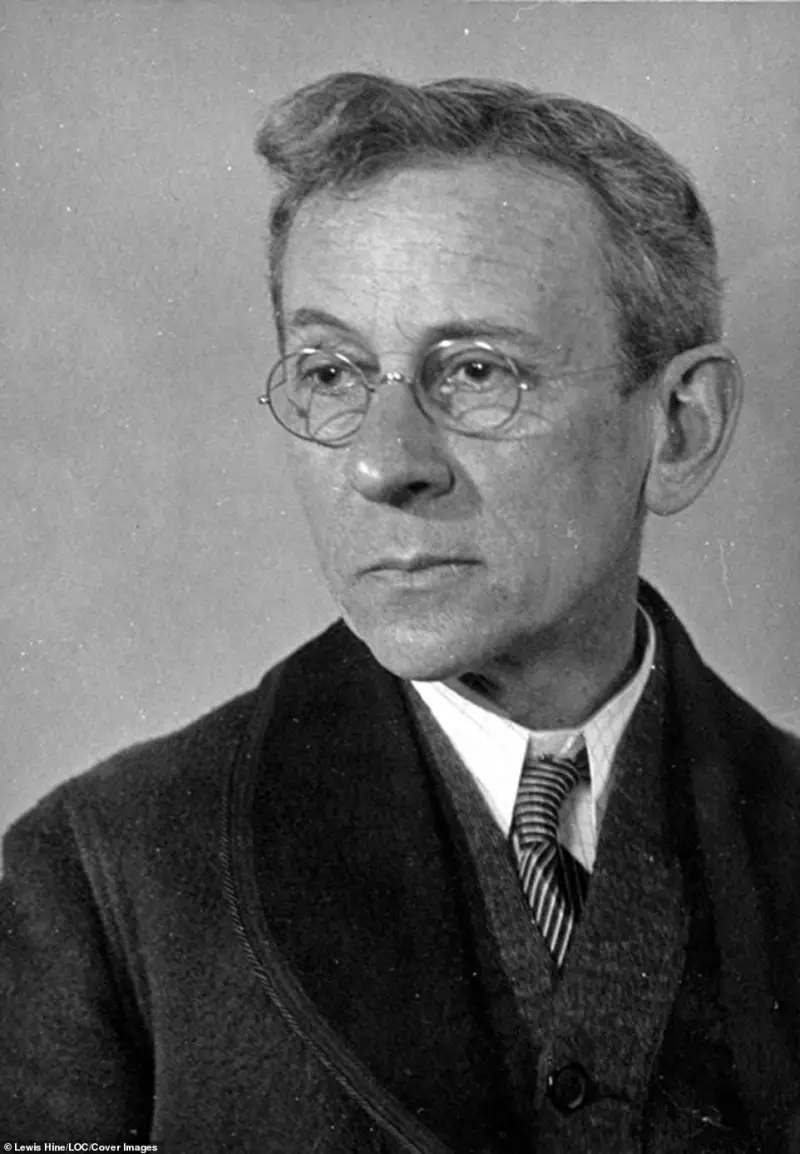
Lewis Hine
Lewis often tricked his way into factories. He pretended to be a seller or negotiated with workers. I interviewed them and documented them. Sometimes he did it secretly. Thanks to his work, the United States learned about the difficult lot of boys selling newspapers, assemblers in heavy industry factories, etc. Lewis took about 5000 photographs over several years. As a result, the government became interested in his work. And in 1916, the United States adopted the Keating-Owens Act, which established a minimum threshold of 14 years, a ban on night work, and an eight-hour working day.
Hein has many stories. Somewhere children were working in a cigar factory, rolling leaves. Somewhere they were sewing dolls for which they had no money. Somewhere they worked with lubricant. Like, for example, Henry, a 14-year-old boy who worked in a mine. He carried two buckets of lubricant, and his path passed along the tracks where carts with coal drove. It's dangerous in the dark. Henry, thanks to Hein, became a symbol of the child labor movement. Then he served in the First World War, returned, got married, started a family and went to work in the mine again. And at the age of 34, when his wife was pregnant with their first child, he was crushed by a stone at work.
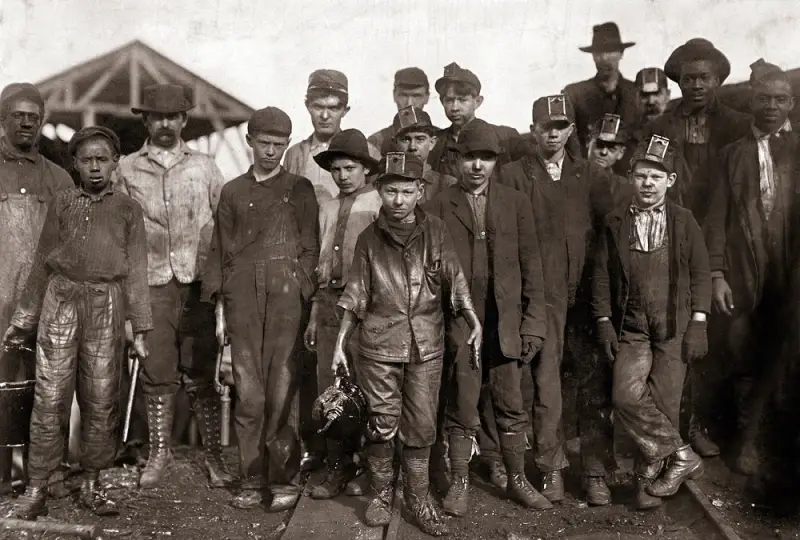
Children at the mine. In the center is the same Henry. Photography by Lewis Hine
There are many stories of children dying or being injured at work. Giles, for example, worked in a spinning mill. Some kind of mechanism fell on his leg, the boy jumped away and fell under the machine. The gears of the spinning machine cut off two of his fingers. The girl Estelle's hand gave out after she caught her hand on a machine at a cotton factory. All the fingers are intact, but apparently the tendon was injured, and the hand became stiff forever. But fifteen-year-old Frank worked 18 hours at a factory that produced books. Around two in the morning he fell asleep at the machine; his hand got caught under the cutter and two fingers were torn off. Two years of trial and he gets $10.
France
Industrialization in France of the century before last was not particularly different from the same period in England and the USA. The same child labor, the same minimum wages for workers.
France entered the 19th century as a rural country. The Industrial Revolution reached it along with the waves of the English Channel and from there spread throughout Europe. Children worked mainly on farms. If a child is not from a wealthy family, then from an early age he went to the field, stable, barracks, where they found him a suitable job. Not to say that the industrial revolution brought something new specifically to child labor. But she made it significantly worse. It seems to me that working in the same factory or weaving factory is more difficult than in the fields. I know it’s difficult here and there if you work long and hard, especially for a child, but it seems to me that it’s somehow easier in nature.
The children went down into the mines and went to the factories. And only in the 30s of the same century did adults think about softening the children's share. In 1833, the Guizot Law came into force, which obliged all settlements with more than 500 people to open schools. Yes, the law did not prohibit children from working and did not limit their time. But if a child goes to school, then he works less. This helped some people a lot.
In 1841, the French passed a child labor law. Children under eight years of age were now prohibited from working. Of course, unofficially they could help their parents somewhere on the farms. But I haven’t set foot in industry. Ten years later, a new law was passed that prohibited children under 14 from working more than 10 hours a day. The working day for children 14-16 years old was reduced to 12 hours.
In the 70s of the last century, the Third Republic came, which finally decided to tackle social issues. Children under 12 years of age are required to go to school. If they worked, it was for some small thing and only after studying. For example, they cleaned shoes. Children from 12 years old could be hired. It was forbidden to work at night. Sunday is a day off for all children under 16 years of age. Yes, laws were broken everywhere. But at least they were accepted. At the end of the 13th century, the minimum age was raised to XNUMX years. The labor inspectorate was already better at monitoring the implementation of laws, and employers were subject to large fines for violations.
PS
Yes, I am pleased that my articles receive dozens of comments. So you're interested. I don’t have time to read everything, but still. To give some of my "fans" another reason to comment, I will leave some documents and sources from which I took information. I would like the computer to translate everything for me and edit it at the same time. But no, GPT4 has not reached me yet. Therefore, on free evenings I find an interesting topic, look for sources and read.
Some sources. Read it, there's a lot of interesting stuff there:
British House of Commons meeting
Testimony of Richard Oastler
And more articles on The Guardian, BBC, Daily Mail, works by Carolyn Tuttle, Lewis Hine and much more.
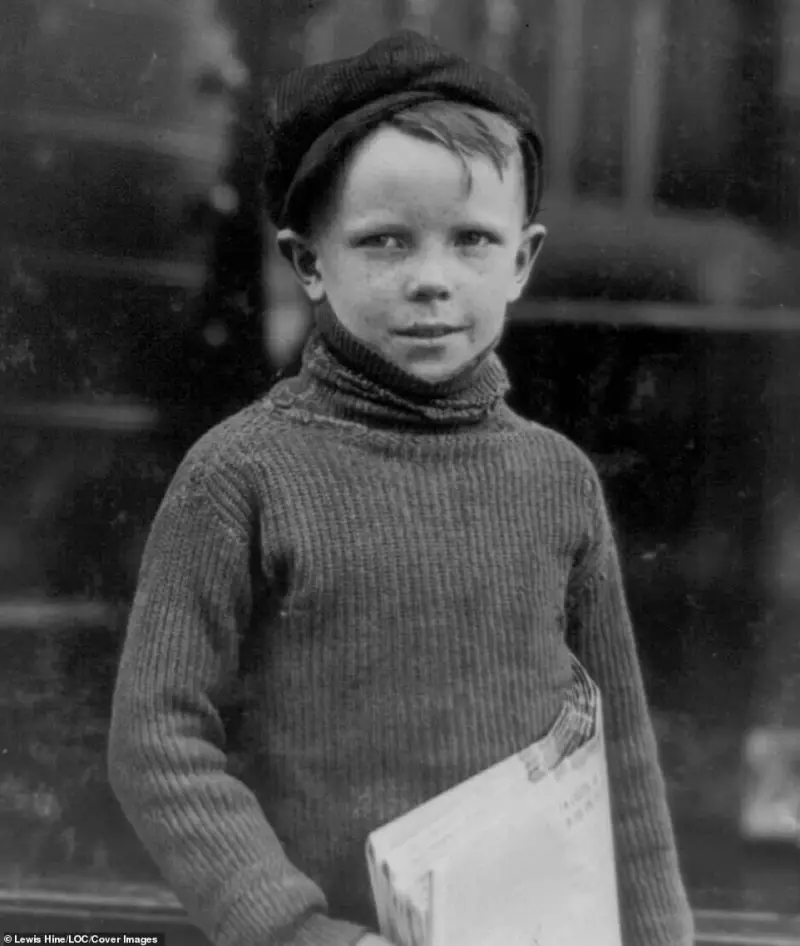
Boy selling newspapers. Photography by Lewis Hine
Information